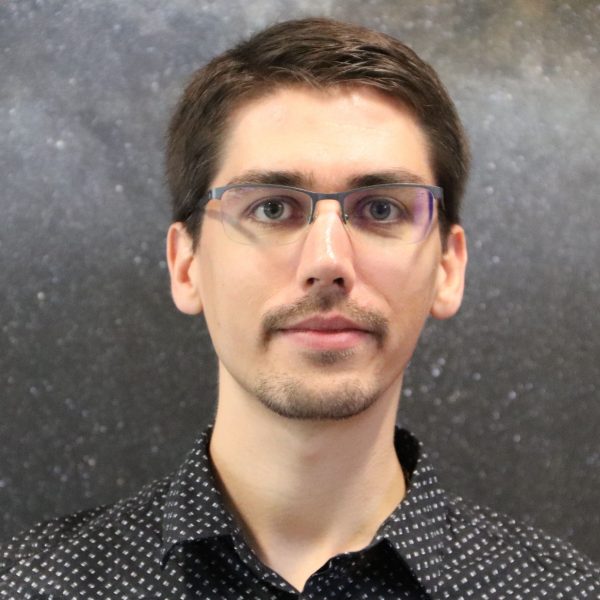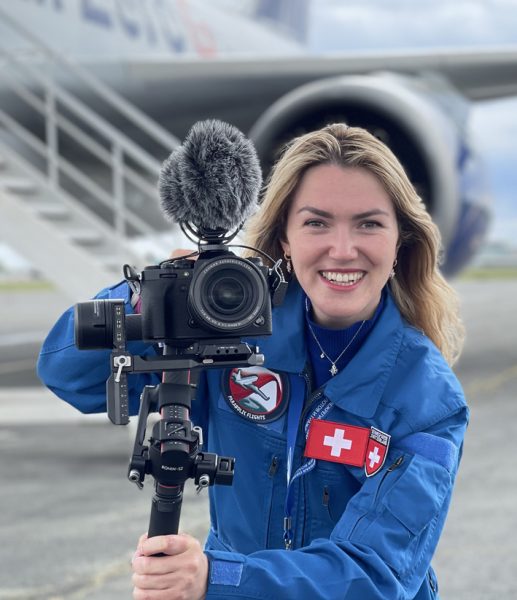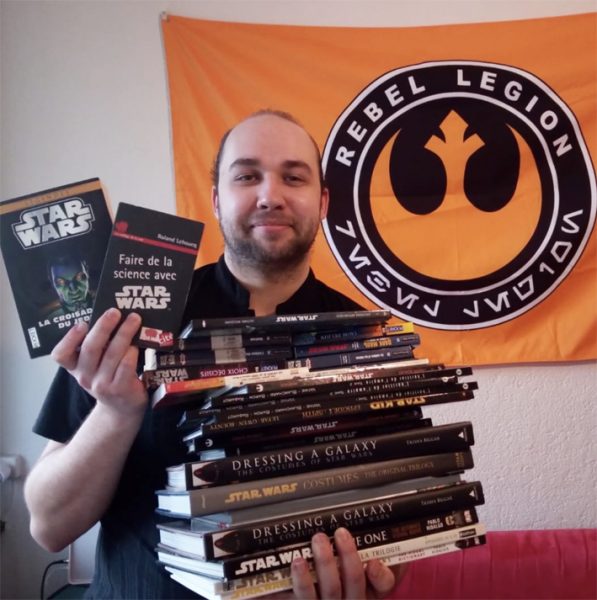What PlanetS scientists think about science fiction

Scientists who like science fiction. A no-go? Or perhaps the opposite? We talked to five scientists from the NCCR PlanetS about their relationship with science fiction and how they assess the influence of science on science fiction and vice versa.

Dr. Vincent Bourrier
Assistant Professor, Observatoire de Genève,
Département d’Astronomie, Université de Genève
What is your favorite science fiction and why?
I truly cannot identify a single one, I’ve read or watched too many riveting works!
But there are some that have left a particular mark on me. In the case of books, for example, it’s The Dune Chronicles, The Three-body problem, or The Mars Trilogy. In the case of movies, there were The Matrix, Contact, Blade Runner, or Arrival. And with the series, I’d like to mention Battlestar Galactica, The Expanse, or Doctor Who that fascinated me.
The common thread to these works is that they captured my imagination, and got me fully immersed into their universe.
One thing I also like about science fiction is that it can mix a lot of genres like space operas, historical fiction, crime fiction, tragedies, etc. I particularly enjoy the Hard SF genre, where authors go for realistic stories and scientific accuracy.
What fascinates you about science fiction?
I think what I like most is anticipation, the projections into possible futures based on our present reality, and the question they raise about our humanity, the impact of technology, and how our species would develop in new situations. I’m interested in how science fiction, in a way like research, continuously reinvents itself by building upon the knowledge, discoveries, and the general feel of its epoch. For example, I’ve started reading science fiction with my father’s books from the ’50s, in which the background theme was often nuclear apocalypse. In more recent years a lot of SF stories I’ve read dealt with terrorism, globalization, ecological catastrophes, ie themes we’re more concerned about today.
To what extent has science fiction influenced your career in research and your work? And how do science fiction and research influence each other, if at all?
Research from many fields – astrophysics, biology, social sciences, engineering, etc – is the source for a lot of science fiction work. In turn, at least for me, research can be a bit like science fiction in that it makes you dream and explore new realities inspired by our present knowledge.
If a skill or event from science fiction could become a reality, which would you want it to be?
Any discovery or technology that would give us the stars like faster-than-light travel or wormholes.

Prof. Dr. Maria Schönbächler,
Dep. of Earth Sciences,
Inst. für Geochemie und Petrologie, ETH Zürich
What is your favorite science fiction and why?
One of my favorite movies is Gattaca (1997) by Andrew Niccol (with Ethan Hawke, Uma Thurman, Jude Law). This is about realizing a dream against all odds. The film shows a future in which genetic engineering is used to grow “better” people. A genetically normal and therefore inferior human realizes his dream of going into space travel, against all societal odds, and gets a hard-fought spot on a manned mission to Saturn’s moon Titan.
My introduction to science fiction was Star Trek: The Original Series, and I still love it, despite the somewhat distorted portrayal of women. But at least, there were women, which was not common at the time, and also the first kiss on TV between black and white was in Star Trek.
What fascinates you about science fiction?
It puts a mirror to our society. For example, if you look at the various Star Trek series, there’s probably no topic that wasn’t addressed, be it the dependency between junkies and their dealers, the expansion of nations, leadership qualities, and challenges in teamwork.
To what extent has science fiction influenced your career in research and your work?
Not really. But there are moments when I am inspired by Star Trek or books by Terry Pratchett.
How do science fiction and research influence each other, if at all?
Science fiction is inspired by science. You can see this in the development of science fiction over time. Things looked quite different in H. G. Wells (The War of the Worlds or The Time Machine) than in the more recent works. At the same time, science fiction takes themes of the present and projects them into the future. For example, in the 1990 Star Trek series they already had tablets, only they didn’t consider that one tablet would be enough for all the notes.
If a skill or event from science fiction could become a reality, which would you want it to be?
“Beaming” – that would be super handy!

Dr. Jean-David Bodénan,
Dep. of Earth Sciences,
Inst. für Geochemie und Petrologie, ETH Zurich,
What is your favorite science fiction and why?
There are so many works of science-fiction I love for different reasons, from the depth and scope of Asimov’s Foundation books to the whimsical and surreal humor of the different media iterations of The Hitchhiker’s Guide to the Galaxy. All of them influenced me in some way and it is difficult to choose.
While it might not be focused on space, my favorite sci-fi work is a movie: Blade Runner. I watched it for the first time when I was very young with my parents. While I didn’t pick up on many of this movie’s themes as a child, its unique atmosphere and design left a strong impression on my young self. I re-visited it as a young adult and beyond its visual qualities, I discovered a movie of rare depth. In this movie, Rick Deckard (played by Harrison Ford), a Blade Runner, is contracted to retire a group of rogue androids – Replicants – who came back to Earth. This chase leads Deckard to question many things, down to his humanity. The movie addresses important themes such as transhumanism (the augmentation of human bodies through the use of technology), our relationship to machines, and what it means to be human. It also touches on space exploration and how the first steps of humanity towards colonizing other planets could be achieved. The story is delivered by masterful cinematography and contains one of cinema’s most emotional monologues delivered by Rutger Hauer. All this, and more, makes Blade Runner one of the greatest movies of all time in my book.
What fascinates you about science fiction?
What I find most fascinating with science fiction is its potential for telling a wide diversity of stories. From commentaries on societal issues by emphasizing them for example in dystopic settings or background for more pulp adventures, the landscape of science-fiction works is rich and diverse. This genre allows creators to explore new worlds and new ideas (or re-visit and update old ones) with no limit beyond their imagination.
To what extent has science fiction influenced your career in research and your work?
It’s probably fair to write that my career and life choices that led to it have been strongly influenced by science fiction works. I can’t remember a time when I haven’t been in contact with it, in good part thanks to my parents. My father used to read me Jules Verne’s books before I could do it myself and I devoured my Mother’s collection of science fiction and fantasy books once I could. Adventures in space or in mysterious locations on our own planet certainly participated in kindling the curiosity and thirst for discovery that led me to undergo a career in research.
While science fiction doesn’t have a direct influence on my day-to-day work, I can’t help but imagine how the work of meteorite and space scientists could help shape the future where space exploration develops far beyond what it currently is. With the information on the compositions and evolution of planets and asteroids, we can help to guide space exploration to be the most efficient.
How do science fiction and research influence each other, if at all?
I think that while interactions between science fiction and research might not be direct, they can be found in the evolution of both fields.
An example could be found in how some “old” science fiction authors from the 30’s writing about spaceships that were all about evolution but didn’t consider the advances in software. In E. E. Doc Smith’s Lensman series, for instance, space travelers were still calculating the directions of their spaceship with slide rulers. Evolutions in technology, brought by research have clearly influenced how authors envision the future evolution of technology.
Today’s exoplanet research is changing how we see the occurrence of planets around stars, especially habitable worlds. It can be very useful for authors that want to create more “realistic” planetary systems.
Science fiction also influences us as researchers. Would we be looking for life so much if the idea of alien life wasn’t so prevalent in fiction? The future technology depicted in science fiction works can also influence research in new techniques or technology. Who hasn’t dreamed of riding on a hoverboard after watching Return to the Future 2? What health professional wouldn’t want a very useful device like Star Trek’s Medical Tricorder to quickly examine patients? Science fiction can be a great source of inspiration for the research and the development of new tools.
If a skill or event from science fiction could become a reality, which would you want it to be?
The invention of interstellar travel, no doubt about it. We have been looking at the stars for a long time, always wondering how they looked from up close, what can be around them…
It is even more exciting today, now that we know that many planets orbit around them thanks to great exoplanet research. Exploring these new worlds would be fascinating on so many levels. There is of course the potential for encountering extra-terrestrial life but it could also teach us much about planet formation by increasing the level of details in which we can look at them and learn about their geology.

Dr. Tatiana Drozhzhova,
PostDoc, Space department,
University of Bern
What is your favorite science fiction and why?
Basically, I have several. Ray Bradbury of course with his «The Martian Chronicles». When my mom read me that book I was at the age of 7, I guess, I truly believed that humans colonized Mars already. And I had a dream to visit that planet too.
Also, I liked a lot Arthur Clark and especially his short story “The Star”, this philosophical story about the star that heralded the birth of Jesus and that destroyed the other civilization. It shows how life is short but valuable and the life of all civilization is only a short moment for the universe. That motivated me to enjoy every moment of life and do only the things which are my real passion – like science and outreach movie creation. Because you never know when everything will end.
The most important science fiction in my life is Carl Sagan’s “Contact” with the main character Eleanor Arroway. The young scientist who was fascinated about space and research since her childhood by her dad. I have the same connection as Eleanor with my dad, and because of my dad, I became a scientist. I was curious about the puzzle of our world since my early childhood and my parents helped me on that way to find answers and with this answers have even deeper questions.
I associated myself with Eleanor during my path in science. Being a woman it was very difficult for her to prove her right to be a scientist. In the past when I had difficult situations in life and felt the pressure that I am a girl, and trying to do things what is usually done by men, I always thought about Eleanor. She was fully concentrated on her research to find extraterrestrial signals. I always admire such type of strong personality and always dream to become one day like she is. Space was always my big passion.
What fascinates you about science fiction?
In general science fiction books give us the possibility to forget about borders and look beyond the horizon.
To what extent has science fiction influenced your career in research and your work?
Space was my big passion for as long as I remember myself. I truly believed that when I grow up one day I can go to space to do research and investigate the other planet and galaxies. Unfortunately, mankind is not so fast in space exploration. Being involved in the CaSSIS project and have the possibility to see that amazing images with the Mars landscape give me a sense that I can touch Mars. I still believe that in the nearest future I can see our planet from the other space body with my own eyes. Probably I am a big dreamer but dreams give us the path for our life.
How do science fiction and research influence each other, if at all?
Look at the Elon Musk space crew! The spaceship and the suits look like from science fiction books and movies! I really admire that guy, this person has a strong goal and no borders. That is fascinating!
If a skill or event from science fiction could become a reality, which would you want it to be?
Oh, I wish a lot! When I was 5 years old my first dream was to build a time machine. Together with my cousin, I tried to create it using the box of an old tv set. You will not believe it, but we failed.
An engine that enables long-distance travel in space. A station for living on Mars. A mirror through which I could travel in a moment to see my friends and parents in Moscow. Captain Nemo’s Nautilus to travel to the bottom of the ocean all over the Earth. The spaceship constructed by the instructions that Eleanor Arroway received with the signals from other space civilization – and to have that amazing brief journey that she had through the universe.

Thibaut Roger,
PhD student, University of Bern
What is your favorite science fiction and why?
My favorite science fiction work of arts is without question Star Wars, but not just the movies, all of its expanded universe (EU), in particular the Legends one corresponding to before Disney bought the license and rebooted the EU, and which consisted of over 300 novels, 120 video games, TV series and thousands of comics.
I honestly don’t remember why nor when I became a fan in the first place. I can say though that what I like now in the Star Wars EU, is its richness, its diversity, and the tons of creative details on so many aliens and characters, or the costumes, making this universe believable, familiar, and yet exotic.
There is something for every taste, good guys, bad guys, anti-heroes, soldiers, bounty hunters, pilots, robots.
Besides Star Wars, I have two other honorable mentions: the Stargate series, and the Fifth Element.
What fascinates you about science fiction?
Science fiction is a field where everything is possible. It includes a lot of rational thinking and problem solving too in order to try to envision potential explanations to exotic technologies and phenomenons and to see elements with different points of view. In that regard, I actually really like to explore the thought experiments of alternative worlds and how culture could be impacted if some elements which are so obvious in our world, are not.
Let’s take the example of the subsurface ocean of Enceladus, and imagine intelligent life as evolved there. The Sun, which was often seen as a god in ancient times on Earth, and which make the day/night cycles, is not visible there. What is going to replace it in its culture, and in which way the Enceladus beings’ society would be different from ours?
To what extent has science fiction influenced your career in research and your work?
Well, without a doubt, science-fiction is the reason why I am doing research today, so I would say quite an extent. I always had an interest in understanding how things work, and thus in science in general and more particularly physics.
But it is Star Wars that made me interested in astrophysics in particular in the fascinating domain of exoplanets, in which science-fiction has never seemed closer! In particular, it is the book Do science with Star Wars from the French astrophysics Roland Lehoucq which has pushed me even more in this direction. This book takes elements from the Star Wars universe, technologies, worlds, etc., and tries to provide an explanation of how they would be possible.
As to say how sci-fi influences my current work in science, it is harder. My research project does not require fancy technologies nor explore the physics of strange worlds. That being said, sci-fi has developed my imagination and thus creative thinking and problem solving, which are essentials skills for the progress of Science.
How do science fiction and research influence each other, if at all?
Science and Science-fiction have always influenced each other… we would not be looking for other worlds and the possibility of life elsewhere otherwise. It is fairly easy to notice how science influences science-fiction: trends. There have always been trends on how technologies work in science-fiction, based on the latest scientific advancements.
As such, the Nautilus of Jules Verne (1869) and its specific look bare a strange resemblance to the then modern designs for submarines, the technologies in Foundation by Isaac Asimov (1942-1944) are based on nuclear power, the energy source that was developed at the same time, while countless Hollywood movies from the last 20 years explain major elements by genetic modifications by scientists or virus mutations.
How sci-fi influences science in return is more subtle and usually unnoticed given the gradual evolution of science. We can however note the example of robots or artificial intelligence, which were imagined way before science even believed they were possible. Moreover, science-fiction with its thought experiments and the vastness of its works enables to start the ethical debates on tomorrow’s technologies and science fields (i.e the famous 3 rules of robotics of Asimov). Science fiction has an important role in guiding society, as it represents the better world we want to aim for, or on the contrary, that we want to avoid in the case of dystopian fiction.
If a skill or event from science fiction could become a reality, which would you want it to be?
I think the most amazing technology to discover, but also one of the most improbable would be the FTL travel, standing for Faster Than Light travel. The time needed to travel to other stars is probably what could block humanity to further develop and expand in the far future, and as such, finding a physical way to travel across the stars would be amazing.
Read also the article on the interview with Dr. Zoë Lehmann Imfeld, Senior Lecturer of the English Department of the University of Zurich, and watch the video interview.
Categories: External Newsletter, News
